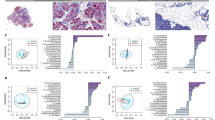Abstract
Summary: The specificity of impairment of pancreatic water and HCO3− secretion in cystic fibrosis (CF) and the role of this impairment in diagnosing CF were studied in 62 CF patients and 66 non-CF controls. A quantitative pancreatic stimulation test using a duodenal bromsulphthalein marker perfusion technique was performed on each subject. The hourly secretion of trypsin, HCO3−, and water was measured. Over three ranges of tryptic activity (<50, 50–1000, and >1000 units per kg body weight per h, selected to represent low, intermediate, and normal acinar function respectively), mean water secretion was significantly lower in CF patients than in controls only when acinar function was low or intermediate. Mean water secretion per kg body weight per h did not vary among controls. In the CF patients, water secretion per kg body weight per h was significantly greater in those with trypsin secretion >1000 (8.28 ± 3.52 ml) than in those with trypsin secretions <50 (4.22 ± 5.8 ml, P < 0.02) or 50–1000 (3.07 ± 2.46 ml, P < 0.001). Mean HCO3− secretion in the CF patients was significantly impaired over all three ranges of tryptic activity when compared with controls. In both CF patients and controls there was a significant positive correlation between HCO3− and trypsin secretion. Analysis of covariance showed that HCO3− secretion was significantly impaired in the CF patients as compared with the controls over the total range of trypsin secretion.
These data demonstate that CF patients have impairment of pancreatic water secretion in association with impaired acinar function but in those with normal acinar function, water secretion appears intact. The impairment of water secretion is thus probably the result of destruction of pancreatic tissue. Pancreatic HCO3− secretion, however, is generally impaired in CF patients even in those with normal pancreatic enzyme and water secretion. Because impairment of HCO3− secretion appears to occur independently of the extent of pancreatic damage, it may represent a primary secretory defect which is related to the defective CF gene. Inasmuch as a few CF patients had HCO3− secretory rates within the control range, the diagnosis cannot be excluded by the demonstration of HCO3− values within this range.
Speculation: Patients with cystic fibrosis have evidence of exocrine gland dysfunction specifically in regard to electrolyte secretion. In the pancreas, impaired HCO3− secretion may be the result of a primary genetic defect. Further investigation of pancreatic HCO3− secretion is warranted to elucidate the nature and controlling factors of secretion as they may provide evidence for the underlying abnormality in cystic fibrosis.
Similar content being viewed by others
Log in or create a free account to read this content
Gain free access to this article, as well as selected content from this journal and more on nature.com
or
Author information
Authors and Affiliations
Rights and permissions
About this article
Cite this article
Gaskin, K., Durie, P., Corey, M. et al. Evidence for a Primary Defect of Pancreatic HCO3− Secretion in Cystic Fibrosis. Pediatr Res 16, 554–557 (1982). https://doi.org/10.1203/00006450-198207000-00012
Issue date:
DOI: https://doi.org/10.1203/00006450-198207000-00012
This article is cited by
-
Nutritional care in children with cystic fibrosis: are our patients becoming better?
European Journal of Clinical Nutrition (2013)
-
Phosphorylation-regulated low-conductance Cl? channels in a human pancreatic duct cell line
Pfl�gers Archiv European Journal of Physiology (1993)
-
Pharmacokinetics of drugs in cystic fibrosis
Clinical Reviews in Allergy (1991)



